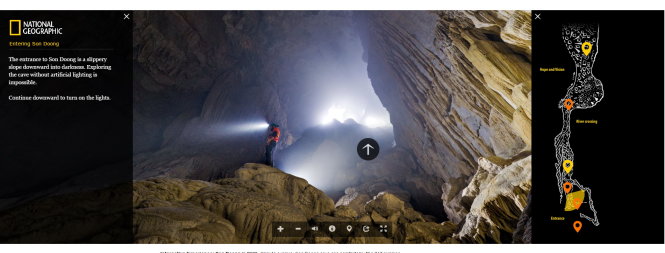The dizzying 360-degree images of Son Doong, the world’s largest cave, located in Vietnam, created as part of a project funded by National Geographic Magazine have held viewers in awe.
A much-awaited photo essay, “Fly through a colossal cave: Son Doong in 360°,” had drawn over 54,000 shares only a few hours after it was released on the website of the world-famous magazine early Thursday morning Vietnam time.
This essay was presented under the Son Doong 360 project supported by the magazine.
The resplendent cave is secluded in the core area of UNESCO-recognized Phong Nha-Ke Bang National Park, located in the central province of Quang Binh.
The essay offers a series of 360° panoramas which allows virtual tourists with an Internet connection to gain stunning peeks into Son Doong Cave’s every nook and cranny.
What makes the project stand out from several other similar ones on Son Doong is that it offers viewers the feeling as if they are there to take in first-hand the cave’s pristine grandeur and its picturesque surrounding areas, without perspiring or warily groping their way through slippery, precarious crevasses.
Readers can magnify all the photos for clearer views of details.
They can also rotate the photos in 360 degrees or have an authentic taste of lifelike forest sounds including birds’ twittering, leaves rustling and springs bubbling.
The entire project has 23 stops, which are also featured in a detailed map appearing on the right corner of the computer screen.
After viewers behold all the scenes at a stop, there are arrows which guide them to either get ready for another adventure at the next stop or return to the previous one.



Photos taken from the National Geographic Magazine's photo essay of Son Doong Cave
Insiders’ stories
The project particularly means a lot to those who yearn to set foot in the awe-inspiring Son Doong at least once before they die but cannot afford an expedition to the cave due to health or financial reasons, Huy Tuong, a Tuoi Tre contributor, wrote.
Tuong said he was lucky to join Swedish photojournalist Martin Edström, the essay’s author, and his crew while they were working inside Son Doong to build a “virtual tour” of the breathtaking cave in late January.
Edström also told Tuong his surprise at seeing how marvelous his completed work is.
After leaving Vietnam in late January, the photographer had to work with over 500 Gigabytes of data and photos during the three following months.
He then transferred his completed work to NatGeo, which planned to launch it early this month.
The magazine, however, waited until May 21 when it made sure its network was upgraded to allow the photo essay to run seamlessly.
Tuong noted the photo essay offers a virtual tour which is sometimes even more revealing than the actual one, as actual trekkers may have difficulty fully taking in the splendor of several pitch-black or gloomy sections in Son Doong.
He also reveled in the singing of “Noi Vong Tay Lon” (Joining Big Arms) by Trinh Cong Son, a revered late Vietnamese composer, at the 14th stop of the Son Doong 360 project.
Tuong said around one month ago, Edström sent him an email with an audio file of the song attached.
The Swede revealed that he loves the melody of the song, which was often hummed or chanted by the porters during the trip.
Tuong then translated the song’s lyrics and shared its significance, particularly during local youths’ formal get-togethers, as well as the huge popularity enjoyed by Trinh Cong Son, several of whose works have been translated into different languages and performed by expat singers.
Intrigued, Edström said he would incorporate the song into his essay.
Tuong, however, also expressed regret at the failure of the Son Doong 360 project to focus its lens on the Great Wall of Vietnam, an overhanging mass of flowstone toward the end of the cave, though the wall was included in the project’s plans.
The project’s last stop is around 200 meters from the wall.
It is ideal to depict the wall’s grandeur around early January, when photographers can wade through its 16-meter-deep, crystal-clear stream to approach the wall, though with great difficulty.
However, Edström and his crew were in Son Doong in late January, when the tides had receded, leaving mud everywhere and thus impeding the team’s access to the wall.
The photos of the wall, taken from afar, are also gorgeous though, Tuong remarked.

Swedish photojournalist Martin Edström poses in front of the Son River, located near the UNESCO-recognized Phong Nha-Ke Bang National Park in the central province of Quang Binh. Photo: GEO
The Son Doong 360 project was sponsored by National Geographic’s Global Exploration Fund, which was established in 1888 to encourage exploration and preserve nature and relics.
So far, it has funded over 10,000 projects at a total cost of US$153 million. The average price tag for each project is around $15,300, and it acts like ‘security’ to attract other sponsors.
Edström is best known for his 360º photo essays featuring environmental issues and natural and cultural heritage sites around the world.
Son Doong Cave is endowed with mammoth chambers that can comfortably house a 747 airplane or an entire New York City block full of 40-story buildings.
The cave was first explored in 2009 by a British caving expert, Howard Limbert, and a local named Ho Khanh.
Prior to this 360-degree photo essay, National Geographic Magazine, which releases nine million copies a month in 33 languages, had already published a story and images of the cave.
The cave has made headlines in other famous media outlets, including national television channels from Japan, Germany, the U.S., England, Italy, and Spain.
Earlier this month, a crew from the American Broadcasting Company went to great lengths to film Son Doong in a live show which awed American viewers.
Like us on Facebook or follow us on Twitter to get the latest news about Vietnam!




















































